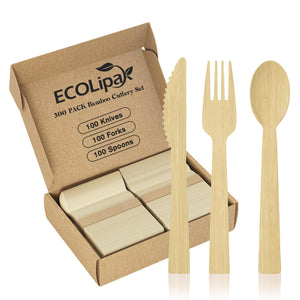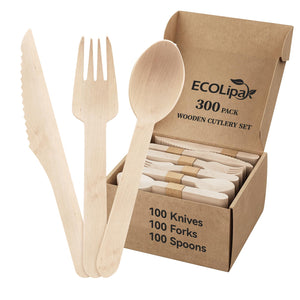Did you know almost 98% of single-use cutlery waste comes from plastic, while only about 2% is compostable? Choosing compostable wooden cutlery—especially from cutlery wood like birch, bamboo, beech, and maple—makes a real difference for your environment and your health. These eco-friendly options offer sturdy, sustainable, and compostable solutions for eco-friendly tableware. When you pick wooden cutlery, you support sustainability and help reduce waste. Ecolipak stays committed to eco-friendly, sustainable dining, making it easy for you to choose environmentally friendly options that fit your lifestyle.
Key Takeaways
-
Choosing wooden cutlery made from birch, bamboo, beech, or maple helps reduce plastic waste and supports a cleaner planet.
-
Wooden cutlery is strong, safe, and comfortable to use, handling hot and cold foods without bending or breaking.
-
These utensils come from renewable resources and break down naturally in compost, making cleanup easy and eco-friendly.
-
Certified wooden cutlery meets strict safety and sustainability standards, giving you peace of mind with every meal.
-
Buying wooden cutlery in bulk saves money and supports your commitment to a greener lifestyle.
Top Cutlery Wood Types
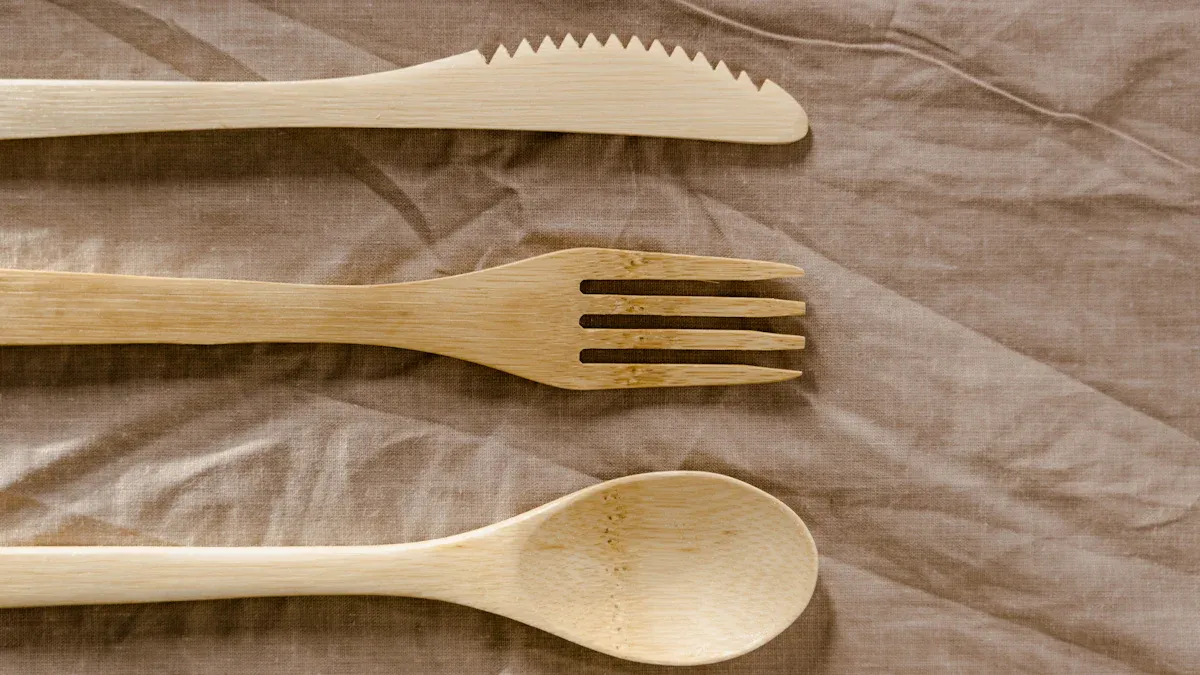
When you choose disposable wooden cutlery, you want to know what makes each type of cutlery wood special. Let’s look at the top choices you’ll find in eco-friendly dining, including the natural wood Ecolipak uses in its Compostable Wooden Cutlery sets.
Birch Wood
Birch wood stands out as a favorite for disposable wooden cutlery. You get a utensil that feels smooth and sturdy in your hand. Birch trees grow back quickly, so they’re a renewable resource. Most birch comes from forests where new trees are always planted, keeping the cycle going.
-
Birch wood is strong and durable, so your fork or knife won’t snap when you dig into your meal.
-
The surface feels smooth and never rough, making every bite comfortable.
-
Birch is naturally antibacterial and free from coatings or dyes, so it’s safe for your family.
-
You can use birch disposable wooden cutlery for hot or cold foods without worrying about bending or breaking.
-
Birch wood breaks down in compost, so it won’t stick around in landfills.
Tip: Birch disposable wooden cutlery is lightweight and easy to pack for picnics, school lunches, or big family gatherings.
Bamboo
Bamboo is a superstar in the world of disposable wooden cutlery. It grows incredibly fast—sometimes up to three feet in just one day! That means you get a highly renewable source for your utensils.
|
Attribute |
Birch Cutlery |
|
|---|---|---|
|
Growth Rate |
3-5 years (very fast) |
15-20 years (moderate) |
|
Strength & Durability |
Strong, splinter-free, comfortable |
Durable, smooth, sturdy |
|
Compostability |
Fully compostable, enriches soil |
Compostable, biodegradable |
|
Antibacterial |
Naturally antibacterial, non-toxic |
Naturally antibacterial, allergen-free |
|
Environmental Impact |
Minimal water, no chemicals, carbon sequestration |
Sustainable forests, replanting, low emissions |
Bamboo disposable wooden cutlery is not just strong—it’s also smooth and splinter-free. You can trust it to handle everything from salads to steaks. Bamboo’s natural antibacterial properties keep your meals safe and healthy. When you toss bamboo cutlery in the compost, it breaks down quickly and helps enrich the soil. Choosing bamboo means you’re helping the planet by reducing plastic waste and supporting sustainable farming.
Note: Bamboo disposable wooden cutlery is perfect for eco-conscious families who want a green lifestyle without giving up convenience.
Beech
Beech wood gives you another excellent option for disposable wooden cutlery. It’s known for its smooth texture and solid feel. Beech trees grow fast and are easy to find, making them a renewable choice.
-
Beech disposable wooden cutlery feels sturdy and comfortable, so you don’t have to worry about breakage.
-
The wood’s fine grain gives each utensil a polished look, perfect for both casual meals and special events.
-
Beech is easy to shape, so you get forks, knives, and spoons that work well for any food.
-
This wood supports sustainable forestry, so you can feel good about your choice.
Beech disposable wooden cutlery combines strength and renewability, making it a balanced pick for eco-friendly dining.
Maple
Maple wood brings both beauty and strength to disposable wooden cutlery. You’ll notice the warm, natural look right away. Maple is a hardwood, so your utensils last through the whole meal without bending or snapping.
-
Maple disposable wooden cutlery is tough and reliable, even for heavier foods.
-
The smooth finish feels great in your hand and looks elegant on the table.
-
Maple is non-toxic and often treated with natural oils, so it’s safe for everyone.
-
This wood comes from responsibly managed forests, supporting sustainability.
-
Maple cutlery is biodegradable and compostable, so it returns to the earth without harm.
Maple’s local sourcing and fast regrowth make it a smart choice for families who care about the environment. When you use maple disposable wooden cutlery, you help reduce landfill waste and support a cleaner planet.
Ecolipak uses only natural wood for its Compostable Wooden Cutlery sets, so you always get a safe, sturdy, and sustainable option for every meal.
Compostable Wooden Cutlery Benefits
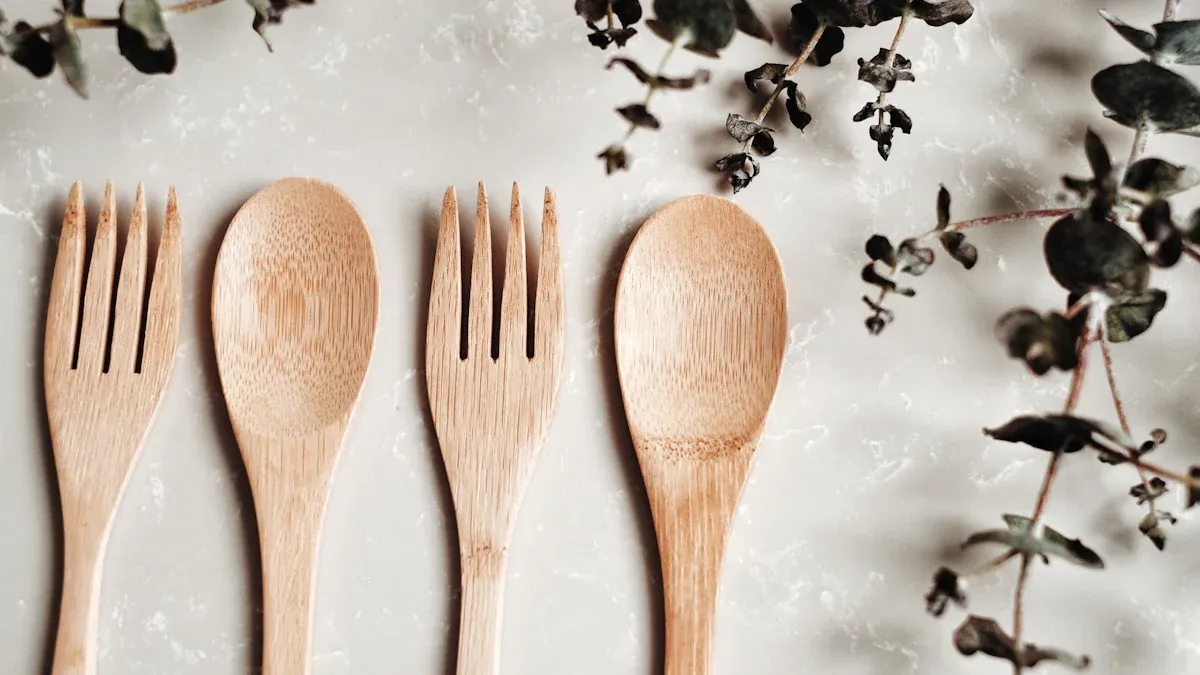
Sustainability
You want your choices to matter for the planet. When you pick disposable wooden cutlery, you support sustainability every time you set the table. These utensils come from renewable resources like birch, beech, maple, and bamboo. Trees and bamboo grow back quickly, so you never have to worry about running out. Ecolipak uses only responsibly sourced wood, making sure forests stay healthy for future generations.
-
Production of wooden cutlery uses less energy than plastic, which depends on fossil fuels.
-
Wooden cutlery supports sustainable forest management and helps lower your carbon footprint.
-
You avoid toxic chemicals, so your meals stay safe and healthy.
Ecolipak has already helped protect 125,000 square meters of green space by selling over 59 million eco-friendly products in 2024. Every time you choose eco-friendly tableware, you join a growing community that values a cleaner, greener world.
Compostability
Compostable cutlery makes cleanup easy and guilt-free. After your meal, you can toss disposable wooden cutlery into your compost bin. It breaks down naturally, just like food scraps. In a home compost pile, wooden cutlery takes about 6 to 12 months to decompose. If you use a commercial composting facility, the process speeds up and can finish in just a few weeks.
|
Aspect |
Home Composting |
Commercial Composting |
|---|---|---|
|
Decomposition Time |
6-12 months |
Few weeks to a few months |
|
Temperature |
122-149°F |
131-160°F |
|
Suitability |
Great for wooden cutlery |
Excellent, even faster |
You help enrich the soil and keep waste out of landfills. Compostable wooden cutlery fits right in with your eco-friendly lifestyle.
Environmental Impact
Switching to eco-friendly disposable wooden cutlery makes a real difference for the environment. Plastic cutlery sticks around for hundreds of years, but wooden cutlery is biodegradable and compostable. It breaks down without leaving harmful chemicals behind. Studies show that wooden utensils harbor fewer bacteria than plastic, making them safer for your family.
-
Wooden cutlery is biodegradable, so it returns to the earth safely.
-
You reduce plastic waste and lower greenhouse gas emissions by up to 70% compared to plastic utensils.
-
Eco-friendly tableware supports sustainable forestry and keeps our planet healthy.
-
Wooden cutlery is lightweight, sturdy, and adds a natural touch to your table.
Ecolipak’s commitment to eco-friendly, sustainable, and biodegradable cutlery means you can enjoy every meal knowing you’re making a positive impact. Choose environmentally friendly options and help create a better world for everyone.
Comparing Compostable Cutlery Materials
Wood vs. Plastic
When you look at wooden cutlery and plastic utensils, the differences are clear. Wooden cutlery comes from renewable resources like birch, beech, maple, and bamboo. These biodegradable materials break down quickly and return to the earth, making them a top choice for eco-friendly families. Plastic cutlery, on the other hand, is made from petroleum. It can take hundreds of years to decompose, filling up landfills and harming the environment.
Here’s a quick comparison:
|
Aspect |
Wooden Cutlery |
Plastic Cutlery |
|---|---|---|
|
Renewability |
Made from natural, renewable sources; biodegradable and compostable |
Petroleum-based, non-biodegradable; pollutes the environment |
|
Safety |
Free from harmful chemicals; safe for food |
Can leach toxins like BPA, especially when heated |
|
Environmental Impact |
Biodegradable and compostable; does not pollute land or oceans |
Stays in landfills for centuries; threatens wildlife |
Wooden cutlery breaks down in composting facilities within months. Plastic sticks around for generations. If you want an environmentally responsible alternative, wooden cutlery is the way to go.
Wood vs. Bamboo
You might wonder if bamboo cutlery is better than wooden cutlery. Both are eco-friendly and biodegradable, but bamboo grows much faster. Bamboo can shoot up several feet in just one day, making it a rapidly renewable resource. Wooden cutlery, while still sustainable, comes from trees that take longer to mature.
-
Bamboo cutlery is lightweight, strong, and heat-resistant.
-
Both bamboo and wooden cutlery are compostable and break down in a few months.
-
Bamboo resists stains and odors, and it has natural antibacterial properties.
-
Some people notice a slight wood taste with wooden cutlery, but bamboo usually stays neutral.
Bamboo cutlery often gets higher satisfaction ratings in food service because it is more durable and stylish. Still, both options offer a premium, rustic look and help protect the environment.
Certifications
When you choose eco-friendly cutlery, certifications matter. They show you that your wooden cutlery meets strict standards for safety, sustainability, and compostability. Look for these important certifications:
|
Certification |
Focus |
Standards/Benefits Ensured |
|---|---|---|
|
FDA |
Food safety |
Safe for food contact; no harmful chemicals |
|
FSC |
Sustainable sourcing |
Wood comes from responsibly managed forests |
|
BPI |
Compostability |
Meets strict compostability standards; breaks down safely in compost |
|
TÜV Austria |
Compostability |
Certified for home and industrial composting |
Ecolipak’s wooden cutlery meets these high standards. You get peace of mind knowing your biodegradable cutlery is safe, sustainable, and truly eco-friendly. Choosing certified products means you help protect the environment and your family’s health.
Practical Use and Features
Durability
You want your utensils to last through every bite, whether you’re at a backyard barbecue or a school lunch. Wooden cutlery stands out for its strength and reliability. Ecolipak’s disposable wooden cutlery goes through strict testing to make sure it won’t snap or splinter, even with tougher foods. Here’s a quick look at how these utensils hold up:
|
Test Method |
What It Checks For |
What It Means for You |
|---|---|---|
|
Dynamic Mechanical Analysis |
Bending and pressure resistance |
Utensils stay strong during use |
|
Nano-indentation |
Hardness and break resistance |
No snapping or splintering |
|
Finite Element Analysis |
Weak point detection |
Improved design for extra durability |
You can trust these utensils for everything from salads to steaks. They won’t bend or break easily, so you can focus on enjoying your meal.
Comfort
Comfort matters, especially when you’re serving guests or packing lunches for your family. Ecolipak’s wooden cutlery feels smooth and splinter-free in your hand. Each fork, knife, and spoon is carefully sanded and shaped for a natural grip. The handles curve gently, making them easy to hold for kids and adults alike. You get a familiar, comfortable dining experience every time.
Tip: The ergonomic design means you can use disposable wooden cutlery at birthday parties, weddings, or even food trucks without worrying about discomfort.
Heat Resistance
Hot soup or grilled veggies? No problem. Wooden cutlery resists heat and doesn’t warp or melt like plastic. You can safely use these utensils with hot or cold foods, knowing they’ll hold their shape. Ecolipak’s disposable wooden cutlery works well for everything from stews to frozen desserts. Just remember to dry them after use if they get wet, so they stay sturdy for your next meal.
You’ll find these utensils perfect for catering, takeout, picnics, and any event where you want a reliable, eco-friendly choice.
Sourcing and Purchasing Tips
Responsible Sourcing
You want your eco-friendly cutlery to come from sources that care about the environment. Responsible sourcing means you look for suppliers who follow strict guidelines and protect forests. Here are some best practices you can use when choosing sustainable wooden cutlery options:
-
Pick wood types like birch and beech. These options are strong, smooth, and safe for food contact.
-
Choose denser woods that resist moisture and don’t splinter easily. This keeps your meals safe and comfortable.
-
Prefer light-colored woods such as birch. They look clean and polish well, giving your table a fresh feel.
-
Always check for certifications like FSC. This proves the wood comes from forests that get replanted and protected.
-
Make sure the wood is renewable and harvested with care. This helps protect wildlife and keeps the environment healthy.
-
Look for suppliers who use low chemical treatments. Natural options support your health and the planet.
-
Ask about traceability and supplier reputation. Reliable options mean you get quality every time.
-
Consider lifecycle analysis and environmental impact. This helps you meet your sustainable goals.
Ecolipak follows these steps for every compostable wooden cutlery set. You get peace of mind knowing your options are truly eco-friendly and sustainable.
Bulk Buying
If you plan a big event or run a business, bulk buying eco-friendly cutlery options saves you money and helps the environment. When you buy more, you pay less per piece. Check out how bulk pricing works:
|
Order Quantity |
Approximate Price per Piece (USD) |
|---|---|
|
1,000 pieces |
$0.01 to $0.07 |
|
5,000 pieces |
$0.01 to $0.02 |
|
20,000 pieces |
$0.01 to $0.02 |
|
50,000 pieces |
Around $0.02 |
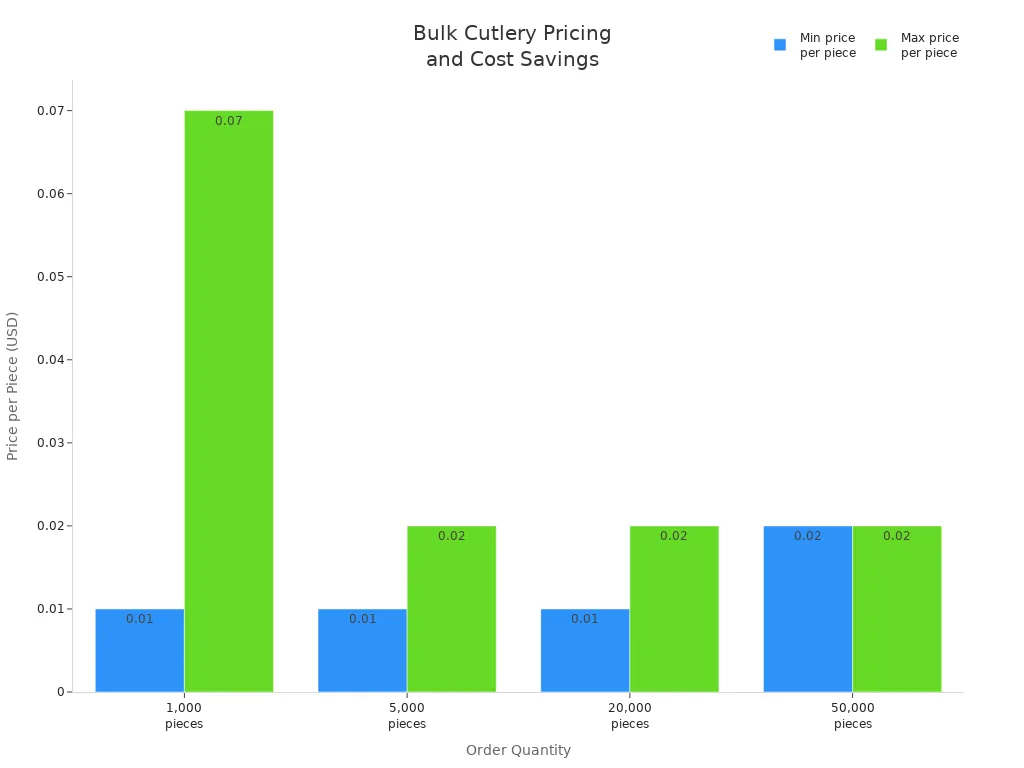
Bulk buying offers more than just savings. You get easier inventory management, fewer supply interruptions, and reduced shipping costs. You also show your customers you care about the environment by choosing certified eco-friendly options. Ecolipak makes it simple for families, individuals, and businesses to order compostable wooden cutlery in bulk. You get reliable, sustainable options for every occasion.
Tip: Bulk buying eco-friendly cutlery options means you always have what you need for parties, picnics, or busy days at work. You save money and help protect the environment at the same time.
Compostable Disposal Practices
Home Composting
You can easily add compostable wooden cutlery to your home compost pile. Just make sure the utensils are untreated and free from coatings. This helps them break down faster and keeps your compost healthy. Place your cutlery in a hot compost pile with a good mix of green (nitrogen-rich) and brown (carbon-rich) materials. This balance helps microbes do their job and speeds up natural decomposition.
Here’s a quick guide for home composting:
|
Step |
What To Do |
|---|---|
|
1 |
Use only untreated, uncoated wooden cutlery |
|
2 |
Mix with food scraps and yard waste |
|
3 |
Keep the pile moist and turn it often |
|
4 |
Avoid adding chemically treated items |
The time it takes for your cutlery to break down depends on the wood type and your composting conditions. Birch, a softwood, can decompose in about 3-6 months. Bamboo, which is denser, may take 6-12 months. Warmer and wetter piles work best.
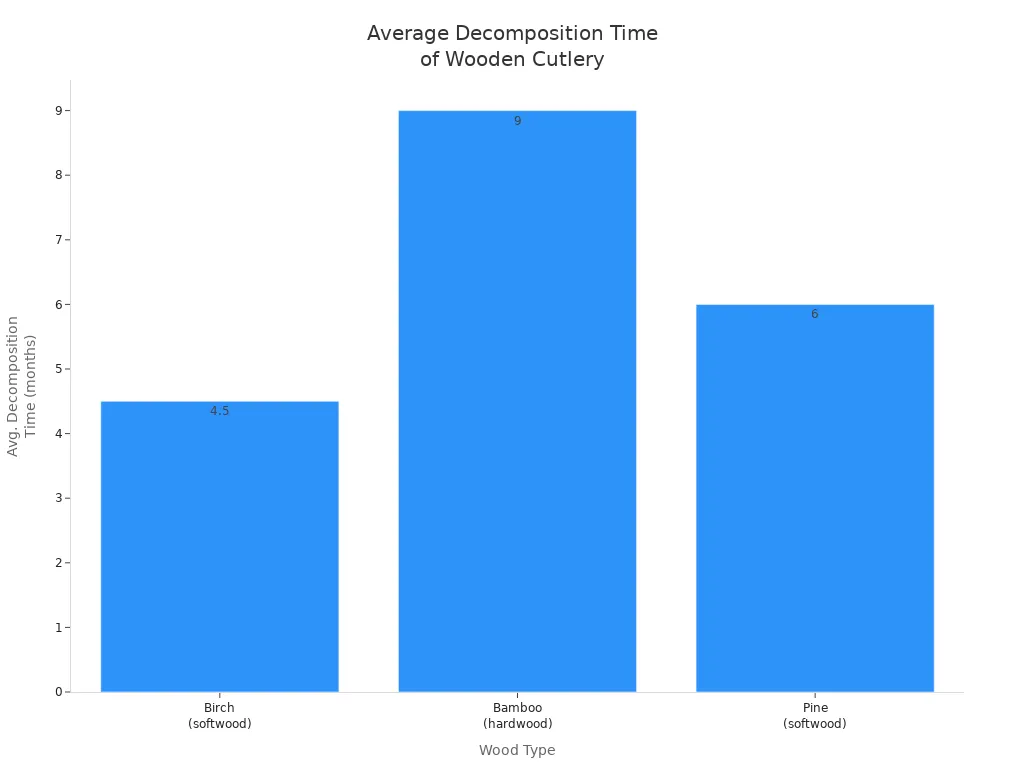
Tip: If you want your compostable cutlery to break down quickly, chop it into smaller pieces before adding it to your pile.
Commercial Composting
If you have access to a commercial composting facility, you can dispose of your biodegradable wooden cutlery there for even faster results. These facilities use high temperatures and controlled airflow to speed up the process. Most compostable utensils break down in 45-60 days under these conditions.
Commercial composting centers look for certifications like BPI and TÜV Austria to make sure products meet strict standards. Ecolipak’s compostable cutlery meets these requirements, so you know it will break down safely and leave no harmful residue.
|
Certification Name |
Standard(s) Referenced |
Description |
|---|---|---|
|
BPI Commercial Compostability |
ASTM D6400, D6868 |
Confirms biodegradation within 180 days in North America |
|
TÜV AUSTRIA OK compost INDUSTRIAL |
EN 13432 |
Meets EU standards for industrial compostability |
Note: Always check with your local facility to see if they accept compostable wooden cutlery.
By following these simple steps, you help keep waste out of landfills and support a cleaner planet. Ecolipak recommends composting all their biodegradable products for the best environmental impact.
Choosing cutlery made from birch, bamboo, beech, or maple gives you a simple way to support a greener world. You help reduce plastic waste and show you care about the planet. When you pick compostable wooden cutlery, like Ecolipak’s, you get:
-
Utensils made from renewable, biodegradable materials
-
Safe, toxin-free dining for your family
-
Support for eco-friendly businesses and responsible sourcing
-
A cleaner, healthier future for everyone
Make every meal a step toward sustainability. Your choices matter!
FAQ
What makes compostable wooden cutlery better for the environment?
You help the planet when you choose compostable wooden cutlery. These utensils come from renewable resources and break down naturally. You keep plastic out of landfills and support a cleaner world for your family.
Can I compost Ecolipak’s wooden cutlery at home?
Yes! You can add Ecolipak’s wooden cutlery to your home compost pile. Just make sure the utensils are clean and free from coatings. They break down in a few months, turning into healthy soil for your garden.
Is wooden cutlery safe for hot foods?
Absolutely. Ecolipak’s wooden cutlery handles hot foods up to 302°F. You can enjoy soup, pasta, or grilled veggies without worrying about melting or warping.
Does wooden cutlery have a taste or smell?
You might notice a mild wood scent at first, but it won’t affect your food. Ecolipak’s cutlery stays neutral, so your meal tastes just the way it should.
How do I know Ecolipak’s cutlery is truly eco-friendly?
Look for certifications like FSC and BPI on Ecolipak’s products. These show you the cutlery comes from responsibly managed forests and meets strict compostability standards. You can trust you’re making a green choice.




